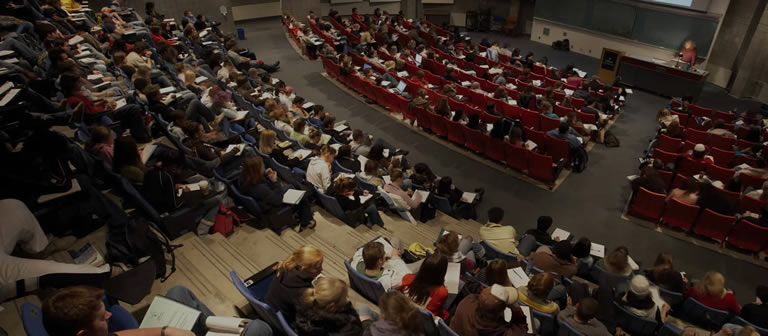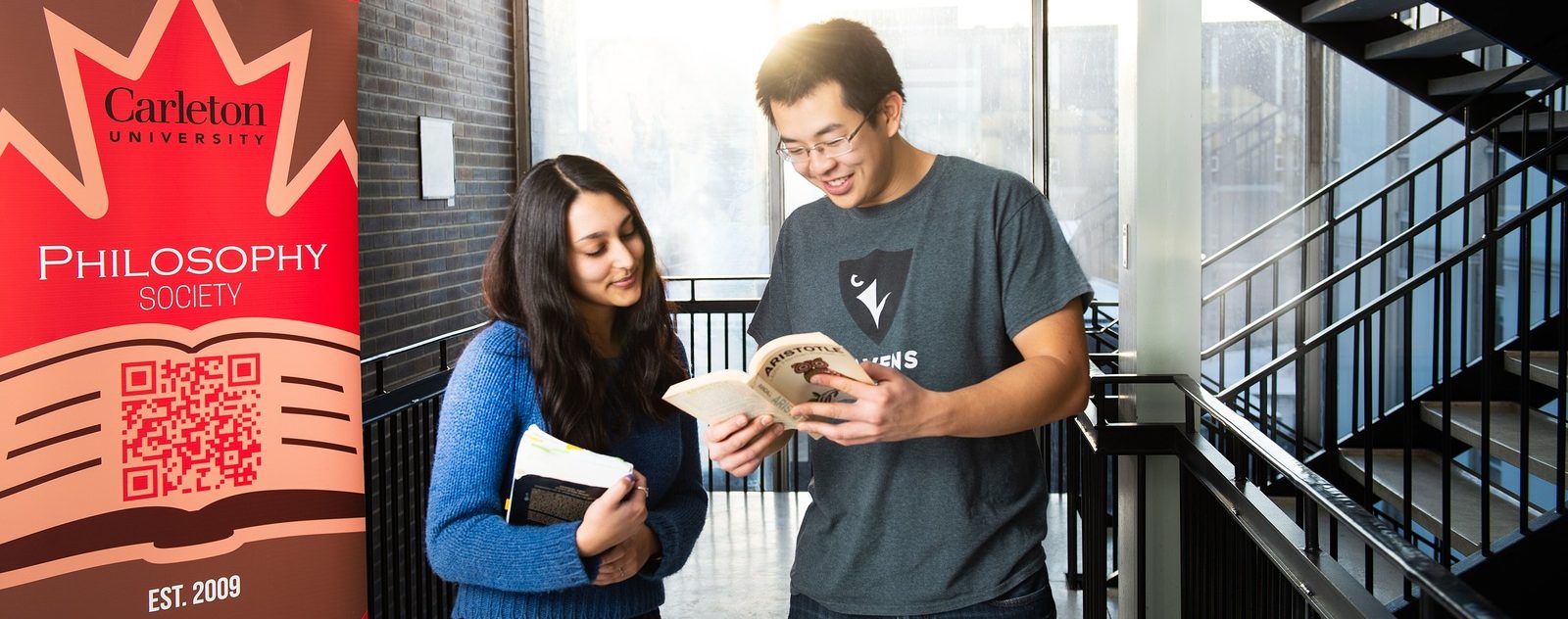| “For me, the Carleton philosophy masters program was an important experience. It fit, for the time in my life and in my academic career. It had the right amount of guidance—gentle but straightforward—with a strong backbone. Because the graduate department at Carleton just consists of a masters program, you get a unique level of attention, and play an important role in day-to-day affairs—things that are sometimes lost in larger departments. Academically, the courses were well-balanced, and I feel I took in more in my year of coursework at Carleton than I have in any year before or since—both in terms of breadth and specification. The thesis is important for getting a feel for academia, and making decisions for your own career—and the faculty at Carleton helped make things very clear.”
– Dan Casey (MA ’17), PhD in Philosophy candidate at York University |
| “The Carleton University Philosophy Department—with its outstanding commitment to undergraduate and graduate teaching, strong research record, and a culture that emphasizes high-quality philosophical discussion in a collegial environment—was an excellent place to learn philosophy. The department houses a faculty with exacting standards, dedicated to ensuring we reached our full potential as philosophers, within an atmosphere of cooperation and collaboration. The program prepared me well to go on to do advanced graduate work, and I enjoyed every moment of it. I would recommend Carleton to anyone serious about studying philosophy.”
– Mary D. Renaud (MA ’13), PhD in Philosophy candidate at Brown University |
| “What sets Carleton apart from other programs is the attention its graduate students receive from the talented and welcoming faculty. I was always welcome to drop into the office of any faculty member in order to discuss my research, or just pose a philosophical question. The intellectual environment was a great mix between being friendly and rigorous. I felt welcomed and respected by the faculty and my peers, but I was also challenged and encouraged to become a better thinker. The friendly environment gave me the confidence to experiment with my thinking, and explore a variety of topics, which allowed me to discover my passion for Stoicism and ancient philosophy. The MA program at Carleton fully prepared me to continue successfully into a PhD program in philosophy. I began the program with a burgeoning interest in philosophy, and graduated a confident researcher, writer, and thinker. As I develop as a young academic, I am grateful for my time at Carleton, and how well it equipped me with the tools I needed to pursue academic philosophy. I owe a great deal of my accomplishments since my time at Carleton directly to the wonderful experiences and thorough training I had while a student there. I would recommend Carleton University to anyone interested in developing their skills as a researcher and writer in an environment which is both welcoming and academically rigorous.”
– Michael Tremblay (MA ’16), PhD in Philosophy candidate at Queen’s University |
| “Carleton University’s MA in Philosophy was the best introduction to graduate school that I could have asked for. The support, help and guidance that I received at every step of the degree, from both the faculty and my fellow graduate students, made the experience both nurturing and challenging. It has set me up for success in my PhD by providing a firm foundation of philosophical knowledge and professionalization. There were few if any other programs that could have provided the same quantity of resources for me to develop a background for specializing in Development Ethics. The willingness of faculty to accommodate my other interests as well, working with me on topics outside of their particular areas of specialization, went above and beyond my expectations. The encouragement I received to submit papers to conferences and to journals, even so early in my academic career, has also been a huge advantage as I have continued through academia. More than anything, the faculty at Carleton are truly exceptional mentors.”
– Holly Longair (MA ’17), PhD in Philosophy candidate at Vanderbilt University |
| “What I remember most about [Philosophy at Carleton] is how supported I was by the faculty – to forge a path that would best advance my research goals. The mentorship I received allowed me to build core competencies as a critical thinker, as an analytical writer, and as a confident communicator.”
– Sarah Rosenhek (MA ’04), Executive Director of Auberge Shalom pour femmes, Montreal |
| “My time spent in the program provided me with numerous opportunities for intellectual and professional development, including: creating and chairing a series of annual conferences, writing sustainability recommendations for the City of Ottawa, advising on a departmental review, and holding various paid teaching and research assistantships. As a research assistant in moral psychology, I became convinced of my need to develop a solid empirical background to complement my work in theory. I would develop this foundation during my doctoral work in cognitive science by focusing on descriptions of ethical decision-making and behaviour in a-typical human populations.The analytical and theoretical mindsets that I developed in my Master’s were strengthened by empirically-informed practice during my doctorate and various other research positions. I now use my expertise in descriptive and prescriptive models of human thinking and action to devise govenrmental system change through a combination of user-centred tools for policy design, culture improvement, and to build leadership competency.
– Deirdre Kelly (MA ’10), Research Advisor with the Innovation Unit for the Labour Program of Canada. |
| “The Carleton MA Program in Philosophy was a joy to complete. I would recommend the program to any student. The department as a whole is warm and supportive. Professors go out of their way to encourage student interests including offering classes inspired by MA students.The program prepares you effectively for writing a thesis or research paper with a broad range of engaging and well taught classes in first year. When it is time to write a thesis, supervisors will engage closely with your work, respect your ideas, and support you in completing the best thesis possible. I truly enjoyed my two years in the program. It is intellectually rigorous and challenging but professors are flexible if students are having difficulties. The department encourages students to collaborate rather than compete with each other. Lastly, as a disabled student I found the department supportive and open-minded. I believe any interested and enthusiastic student would have a great time in the program.”
– Rebecca Robb, (MA ’18) |
| “Carleton’s MA program in Philosophy provided me with an intimate and supportive setting where I could hone my research skills, engage meaningfully with complex texts, and work alongside passionate academics as well as a small cohort of fellow graduate students. I had a direct line to my graduate supervisor and many other faculty members, which allowed me to improve my written communication skills, consider a wide range of perspectives, and learn how to express my own perspective in a clear and compelling way. The opportunities that I had to work as a Teaching Assistant, Research Assistant, and to present my research at the department’s research day event provided me with invaluable opportunities to develop my research and public-speaking skills. I have worked on Parliament Hill for the last 13 years, first at the Library of Parliament and currently at the House of Commons as a Procedural Clerk. In my current capacity, I provide advice about parliamentary procedure to the Speaker of the House of Commons, Members of Parliament, senior officials and the general public. My ability to quickly synthesize complex materials and distill the salient details is a skill I use on a daily basis, and one which I have used while drafting book chapters, training new Members of Parliament, and supporting the work of multiple parliamentary committees. On a personal level, the thoughtful and wide-ranging conversations that we had about ethical issues helped me to clarify my own values and place in the world, which have led me to participate in deeply fulfilling volunteer work as a member of a refugee sponsorship group, in a leadership role within my union, as a trainer for the LGBTQ2+ Positive Space program, as well as with the Government of Canada Charitable Workplace Campaign.”
– Jubilee Jackson, (MA ’08), Procedural Clerk at the House of Commons |
| “Not only do I look back very fondly on my time as an MA student in the philosophy department at Carleton, but my time there has had a big influence on my professional success since I graduated. I developed skills in critical reading, critical thinking, and clear and concise writing that are incredibly valuable in any profession. The faculty in the philosophy department challenged me to produce high quality work while providing the support and guidance I needed to meet that challenge, and I was surrounded by a student body that was passionate about their work. If you are passionate about philosophy and want to develop skills that will help you in the future, I would definitely recommend doing your MA at Carleton.”
– Kevin Churchill (MA 2015); Ravens basketball player and assistant coach (2008-2016); Director, Elite Camps Outdoor Leadership Centre, Hoop Dreams Overnight Basketball Camp |
| “The best thing about the Carleton Philosophy Department are its dedicated faculty members. My time there allowed me to explore very different sets of interests with remarkable professors that always went the extra mile for me when I needed it. From Ancient Ethics, to close readings of Merelau-Ponty’s Phenomenology of Perception, or focusing on the details of analytic Philosophy of Action (just to name a few!), I was thrilled to be able to grow and explore philosophically with caring individuals that were invested in my learning and wellbeing. The small class sizes and one-on-one reading courses I had access to make the level of attention and mentorship I received there hard to surpass. I was also glad to be part of a vibrant set of peers that discussed issues of interest with me and supported me during my time there. I strongly recommend Carleton to anyone looking for a well-rounded philosophical education in a community of dedicated academics.”
– Sebastian Rodriguez Duque (MA ’17), PhD in Philosophy candidate at McGillUniversity
|

